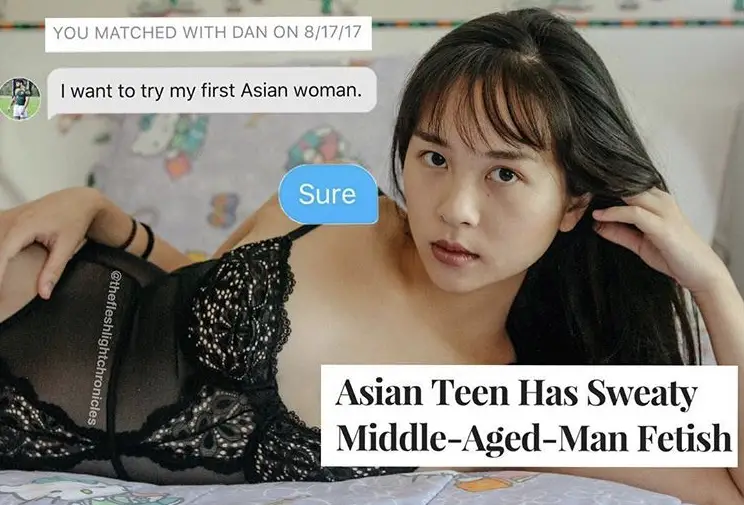Lillian, a senior in college studying political science and art history, found a new way to react to distasteful Tinder messages: by making them into art and posting them on Instagram.
Her account, @thefleshlightchronicles, has 24.3K followers and counting. By posting pictures of Tinder messages pasted over serious pictures of herself, she hopes to inspire other women, especially women of color, and let them know that this happens to many girls. Using her own life experiences, Sun has become an inspiration to many.
Although the success came as a bit of a surprise, Sun reflects on the importance of accounts like these, hookup culture and dealing with online hate.
Rebecca Crosby: What exactly is your account, can you describe it?
Lillian: Basically, I would say it’s a meme account that I use to talk about issues that pertain to my own life experiences as a woman of color. I use humor to share my experiences to help other women of color feel comfortable sharing theirs.
RC: How did you come up with the idea for this account?
L: It actually started as a finsta where I would post nasty messages from men on Tinder as a joke with my friends. I thought it would be funny to see the juxtaposition of having serious facial expressions with comical messages over my face.
https://www.instagram.com/p/BgR0AQYBFOm/?taken-by=thefleshlightchronicles
RC: How do you cope with receiving so many messages like these?
L: I think it definitely used to affect me more when I first started using Tinder. I started using humor to cope with it and joke about it with my friends. The sad reality about it is that over time I have just become desensitized to it.
RC: How does being a woman of color affect the remarks that are made to you?
L: I definitely receive messages that my white friends do not. Mostly fetishization methods, either men seeing it as a positive or negative. Sometimes it manifests in more violent and degrading messages. It’s far higher than the percentage that my white female friends get and is definitely related to my race.
RC: How do you think online dating apps have changed the way college students and young people talk to each other?
L: Now there is a much more blatant emphasize on sex and language that is much more direct about it. It’s geared more toward sex, making hookup culture more accessible and prevalent. It’s much easier to message someone now, without the stress of face-to-face interaction. Since going on Tinder, a lot of how we date and hook up is from these sites, which completely changes the way we see the interactions and the frequency with which we seek them.
RC: Do you think apps like Tinder contribute to a more modern type of sexism?
L: Definitely. Tinder is both a symptom and a propagator of various forms of sexism. It makes it easier for men to say these things because there’s a lack of community. Many problems with sexism that we already had before are getting expounded from dating apps like Tinder.
https://www.instagram.com/p/BewOF5Fhgba/?taken-by=thefleshlightchronicles
RC: Do you think the current political climate affects the way men believe they can act?
L: Absolutely, I think that with the rise of Trump and the example that he sets a lot of men feel more comfortable exhibiting these behaviors. There is definitely a correlation between Trump and the number of acts of sexism and racism in our country increasing, but Trump is not the only reason that they’re acting this way.
RC: What is your response to people saying this is just “boys being boys”?
L: With that phrase specifically, I say that men are the way that they are because of how they’ve been socialized in our society. Many things that we tell them it’s okay to do, in reality are harming a lot of other people. Just because something is a norm doesn’t mean it should continue being a norm if it’s directly harming another population of people.
RC: Do you feel that your posts are relatable to many college women?
L: I do feel that they are relatable, because a lot of us are on dating apps like Tinder, and a lot of us have been involved in hookup culture within college campuses. It’s very similar across a lot of college campuses, especially with objectification and fetishizing. Hookup culture is seen as a source of social currency, it’s almost an obligation, as we’re not cool if we don’t do it.
RC: Did you expect your account to become this successful?
L: No, it honestly just began as a joke between me and my friends. The success is definitely a pleasant surprise, and a lot of it is stemming from the new press from different publications.
RC: What is the impact that you hope your account makes?
L: I want this account to be educating in some way and helpful in that sense to other women of color. Not many spaces are made for us and by us; I want to expand the stuff that is talked about beyond myself to the experiences of women of color who have different experiences and identities that I am not able to talk about.
RC: What do you think should be learned from this?
L: It depends on who you are. I want the take away to be different depending on if you’re a woman of color, white woman, white man or a man of color. For women of color I would like them to know that you’re not alone. These things happen to a bunch of us, but here you’ll find a source of empowerment and a set of experiences that you couldn’t find the words for before.
For white men, thank you for your interest in this account and I’m glad that you’re learning, and I want you to learn, but also understand that this space was not meant directly for you. You are a guest in this space. By all means learn and participate but be respectful.
RC: What do you think needs to change?
L: A lot of the burden of education has historically fallen on women of color, and we are already exhausted with our own survival. I think we need to urge other allies who are white or male to step into those roles when they can. On a broader systematic level, we need to have a change in leadership. Who we let come into power is obviously white men who preserve that power and privilege at all costs.
With campaigns and funding of smaller non-profits, gradually it will start to affect the upper levels, which will in turn affect change in other places. It is not something that will change overnight, it is a constant battle that we will have to make.
https://www.instagram.com/p/BbNeveGD4aU/?taken-by=thefleshlightchronicles
RC: The contrast between the pictures and the Tinder messages is very interesting. Why do you choose to add pictures like these?
L: Basically, for the humor. Usually, they relate to the message. I found that the reality of working within the mediums, the face and body become commodities. If other people are going to learn and get stuff out of this account, I want them to do it in a way that they find consumable. Commodifying my own body and face is just a reality of Instagram if I want people to learn and take away other things.
RC: Do you receive a lot of hate messages on this account and how do you handle them?
L: I do receive a lot of hate messages. Recently, it’s a new cusp, with a lot of death threats, that I’m gross and spreading hate and racism, which is wild. I get a lot of comments like that from men either DMing me these things or commenting on my pictures. Along with the awful Tinder messages in general, sometimes people on Tinder recognize me from my Instagram, and then they go off.
To handle this, I’ve really just become desensitized. I’ve dealt with this stuff for a couple of years now, but it has been a lot harder recently. When it gets bad I just have to take a breather from Instagram, do things that I love and have always rejuvenated me and spend time with people who love and support me. Having found a community of other women of color has been especially important.
RC: What advice do you have to girls who receive so many Tinder messages like these?
L: While I encourage forms of fighting back, I also encourage you to think of your own safety. Sometimes, it is not feasible to retort back with so many remarks. Take care of yourself, do important self-care and don’t be afraid to delete these apps. It’s not worth it to suffer for the goal of attaining a boyfriend or a hookup.

















